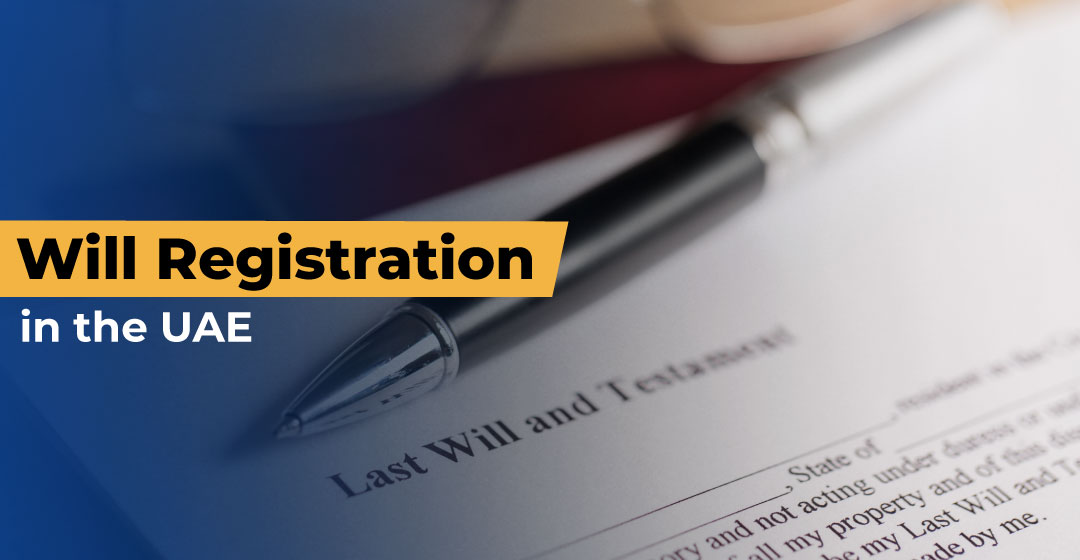Will registration in the UAE is a crucial process that ensures your assets are distributed according to your wishes after your passing. You provide clarity and security for your beneficiaries, minimizing potential disputes, by legally documenting your intentions in the Will. The UAE offers several avenues for Will registration, including the Dubai International Financial Centre (DIFC) Courts Wills Service Centre and the Abu Dhabi Judicial Department (ADJD). Each of these jurisdictions has specific procedures and requirements to validate and register a Will. Understanding these processes is essential for effective estate planning within the UAE’s legal framework.
Will Registration in the UAE: Step-by-Step Process
Registering a Will in the UAE involves a structured process to ensure its legal validity and the proper distribution of your assets. Below is a step-by-step guide given.
1. Determine Eligibility
You must be at least 21 years old and of sound mind to register a Will in the UAE. The Will must be in writing, as verbal Wills are not recognized under UAE law. The Will must be signed by you in the presence of two adult witnesses who are not beneficiaries (applicable to DIFC Wills).
2. Choose the Appropriate Registration Authority
The UAE offers two main venues for Will registration, each with its own procedures. Dubai International Financial Centre (DIFC) Wills Service Centre provides a platform for non-Muslim expatriates to register their Wills, ensuring asset distribution aligns with personal wishes. Abu Dhabi Judicial Department (ADJD) offers Will registration services for non-Muslims and Muslims, allowing them to dictate asset distribution and guardianship matters.
3. Gather Necessary Documentation
The key document needed to make a Will is a passport. In case of ADJD Wills, passport and Emirates ID is required for UAE residents. For non-residents, passport and proof of ownership for at least one of the assets. For DIFC Wills, only passport is necessary.
4. Draft the Will
Consult with a legal professional experienced in UAE inheritance laws to draft your Will. Ensure it clearly outlines the distribution of assets, appoints executors, and specifies guardianship for minor children if necessary. The Will should be comprehensive and comply with the legal standards of the chosen registration authority.
5. Translate the Will (If Required)
The Will may need to be translated into Arabic depending on the registration authority. For instance, Wills registered with the Dubai Courts and the ADJD require an Arabic translation, while the DIFC Wills Service Centre accepts Wills in English. Ensure that the translation is certified to avoid any legal discrepancies.
6. Schedule an Appointment for Registration
Once the Will is prepared and all documents are in order, schedule an appointment with the chosen registration authority. Appointments can be booked through a Will writing service provider and registrations can be completed virtually or in-person.
7. Attend the Registration Appointment
Attend the registration appointment and complete the identification process.
Why is Registration Important in the UAE?
Will registration is important in the UAE because it ensures legal recognition of your final wishes, secures guardianship for minor children, and enables a streamlined probate process.
1. Legal Recognition
A registered Will ensures that your asset distribution wishes are legally recognized and enforceable within the UAE’s jurisdiction. This legal acknowledgement provides clarity and authority to your directives.
2. Avoiding Intestate Succession
Your assets are distributed according to the UAE’s default intestacy laws or home country law (depending on your religion and nationality), without a registered Will. This might not align with your personal preferences. Having a Will allows you to specify your beneficiaries, ensuring your assets are allocated as you intend.
3. Guardianship of Minor Children
A Will enables you to appoint guardians for your minor children, ensuring their care aligns with your wishes. The decision may default to local courts, potentially leading to outcomes contrary to your desires without this specification.
4. Protection of Expatriate Assets
Registering a Will allows expats for the distribution of UAE-based assets according to personal wishes, rather than default laws.
5. Streamlined Probate Process
A registered Will simplifies the probate process, making it more straightforward for executors to manage and distribute your estate. This efficiency reduces potential legal challenges and delays, providing peace of mind to your beneficiaries.
Will Registration Authorities
The UAE has established 2 important institutions to facilitate the registration of Wills as given below.
- Dubai International Financial Centre (DIFC) Courts Wills Service Centre: Provides a platform for non-Muslims to register their wills under a common law framework. The DIFC ensures that their assets are distributed according to their wishes
- Abu Dhabi Judicial Department (ADJD): Offers Will registration services for non-Muslims and Muslims. ADJD Will allows them to dictate asset distribution and guardianship matters
Types of DIFC Wills in the UAE
Non-Muslim residents have the option to register various types of Wills through the Dubai International Financial Centre (DIFC) Courts Wills Service. Each Will type is designed to address specific aspects of an individual’s estate planning needs. Below is an overview of these Will types:
1. Guardianship Will
A Guardianship Will is specifically designed to appoint guardians for minor children. A guardianship Will ensures that, in the event of the testator’s passing, the designated individuals will assume legal responsibility for the care and upbringing of the minor children.
2. Property Will
The Property Will allows individuals to specify the distribution of real estate properties within the UAE. The Property Will is ideal for those who own multiple properties and wish to clearly define beneficiaries for each. The testator ensures that their real estate assets are allocated according to their intentions by registering a property Will.
3. Business Owners Will
The Business Owners Will covers shareholdings in separate businesses within the UAE. The business owners will ensure a smooth transition of business ownership, specifying who will inherit the testator’s business interests. It’s essential for business continuity and provides clarity to both family members and business partners.
4. Financial Assets Will
The Financial Assets Will pertain to up to ten bank or brokerage accounts registered in the UAE. The financial assets will allow individuals to designate beneficiaries for their financial assets. It ensures that their bank accounts and investments are distributed according to their wishes. It’s particularly useful for those with substantial financial holdings across multiple accounts.
5. Full Will
A Full Will provides comprehensive coverage, encompassing all of the individual’s movable and immovable assets within the UAE. A full Will includes real estate, financial accounts, personal belongings, and the appointment of guardians for minor children. It offers a holistic approach to estate planning, ensuring that all aspects of the testator’s estate are addressed in a single document.
By selecting the appropriate type of Will, individuals can ensure that their assets and loved ones are protected under their wishes within the UAE’s legal framework.
Conclusion
Registering a Will in the UAE is a crucial step for both residents and expatriates to ensure that their assets are distributed according to their wishes. By understanding the legal framework and following the appropriate registration processes, individuals can provide clarity and security for their loved ones, safeguarding their legacy within the UAE’s jurisdiction.
FAQs on Will Registration in the UAE
How to write a Will in the UAE?
Write a Will in the UAE by clearly specifying asset distribution, guardianship, and executor appointments. If required, translate it to Arabic, and register with the relevant authority.
What are the Will registration requirements in the UAE?
Will registration in the UAE requires a valid passport. Also, the testator must be over 21 years of age.
How much does it cost to register a Will in the UAE?
Cost varies by type and registering authority. For instance, registering a Full Will with the DIFC Wills Service Centre costs AED 10,000, while a Single Will with the Abu Dhabi Judicial Department costs AED 950.
How long does it take to register a Will in the UAE?
The time to register a Will in the UAE depends on the chosen authority and the completeness of your documentation. DIFC WSC and ADJD offer online submissions and video call registrations, potentially expediting the process.











 Founder's Podcast
Founder's Podcast 
